

Top Ed-Tech Trends of 2012: The Battle to Open Textbooks. Part 6 of my Top Ed-Tech Trends of 2012 series Digital Textbooks When I looked at the most significant trends in educational technology last year, I opted to write about the “Digital Library” in lieu of digital textbooks.
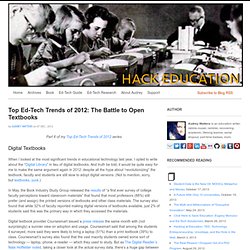
And truth be told, it would be quite easy for me to make the same argument again in 2012: despite all the hype about “revolutionizing” the textbook, faculty and students are still slow to adopt digital versions. (Not to mention, sorry, but textbooks, yuck.) In May, the Book Industry Study Group released the results of “a first ever survey of college faculty perceptions toward classroom materials” that found that most professors (88%) still prefer (and assign) the printed versions of textbooks and other class materials. Digital textbook provider Coursesmart issued a press release the same month with (not surprisingly) a sunnier view on adoption and usage. (Answer: it's Apple.) Apple and the Digital Textbook Counter-Revolution. Hesse.pdf. Huffington’s Bogus Defense of Unpaid Bloggers. Tuesday, Aug 2, 2011, 7:56 pm BY Mike Elk While many view the labor practices of the Huffington Post as affecting only a small handful of writers, Arianna Huffington’s willingness to classify people working for her site as “non-employees” could impact the rights of all workers.
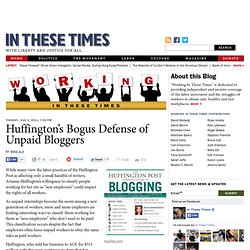
As unpaid internships become the norm among a new generation of workers, more and more employers are finding interesting ways to classify those working for them as “non-employees” who don't need to be paid. This classification occurs despite the fact that employers often force unpaid workers to obey the same rules as paid workers.
923.full.pdf. The genesis and emergence of Education 3.0 in higher education and its potential for Africa. Articles/DabbaughPLE.pdf. The Seek > Sense > Share Framework. Seek Sense Share Inside Learning Technologies [This article appears in Inside Learning Technologies January 2014] Simple standards facilitated with a light touch, enables knowledge workers to capture, interpret and share their knowledge.
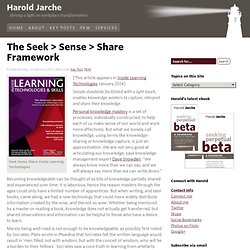
Personal knowledge mastery is a set of processes, individually constructed, to help each of us make sense of our world and work more effectively. But what we loosely call knowledge, using terms like knowledge-sharing or knowledge capture, is just an approximation. We are not very good at articulating our knowledge, says knowledge management expert Dave Snowden: “We always know more than we can say, and we will always say more than we can write down.”
The future of publishing will be shaped by a more dynamic social reading experience. Bob Stein explores how publishing might evolve as it moves from the printed page to the networked screen, particularly with regard to author-reader relationships and the wider social reading experience.
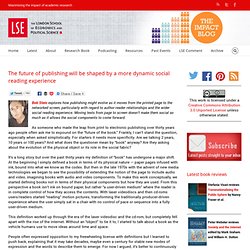
Moving texts from page to screen doesn’t make them social so much as it allows the social components to come forward. As someone who made the leap from print to electronic publishing over thirty years ago people often ask me to expound on the “future of the book.” Frankly, I can’t stand the question, especially when asked simplistically. For starters it needs more specificity. Connected Learning: An Agenda for Research and Design. This report is a synthesis of ongoing research, design, and implementation of an approach to education called “connected learning.”
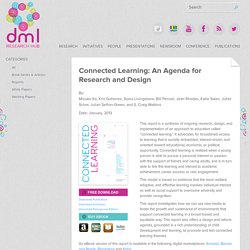
It advocates for broadened access to learning that is socially embedded, interest-driven, and oriented toward educational, economic, or political opportunity. Connected learning is realized when a young person is able to pursue a personal interest or passion with the support of friends and caring adults, and is in turn able to link this learning and interest to academic achievement, career success or civic engagement. This model is based on evidence that the most resilient, adaptive, and effective learning involves individual interest as well as social support to overcome adversity and provide recognition. 9780262513609_Civic_Potential_of_Games.pdf. 9780262513593_Future_of_Learning.pdf.
9780262513623_Confronting_the_Challenges.pdf. OpenMedia.ca - Engage, Educate, Empower. IFLScience: Cool world map shows every Internet connection. Internet cartographer John Matherly came up with this map showing all of the devices connected to the Internet in the world.
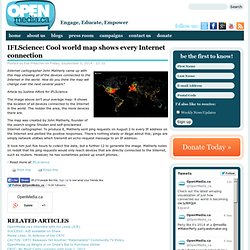
How do you think the map will change over the next several years? Article by Justine Alford for IFLScience The image above isn’t your average map: it shows the location of all devices connected to the Internet in the world. The redder the area, the more devices there are. The map was created by John Matherly, founder of the search engine Shodan and self-proclaimed Internet cartographer. It took him just five hours to collect the data, but a further 12 to generate the image. KnowingKnowledge_LowRes.pdf. We Need Online Alter Egos Now More Than Ever. Lexigraphs I is a group portrait of Twitter users in which each person appears as a silhouette outlined with words derived from their updates and animated by the rhythm of their postings (click to expand).
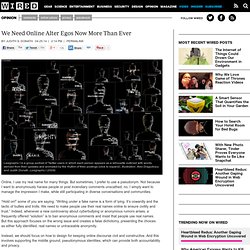
Illustration: Alex Dragulescu and Judith Donath, Lexigraphs I (2009) Online, I use my real name for many things. Who Owns Your Data?